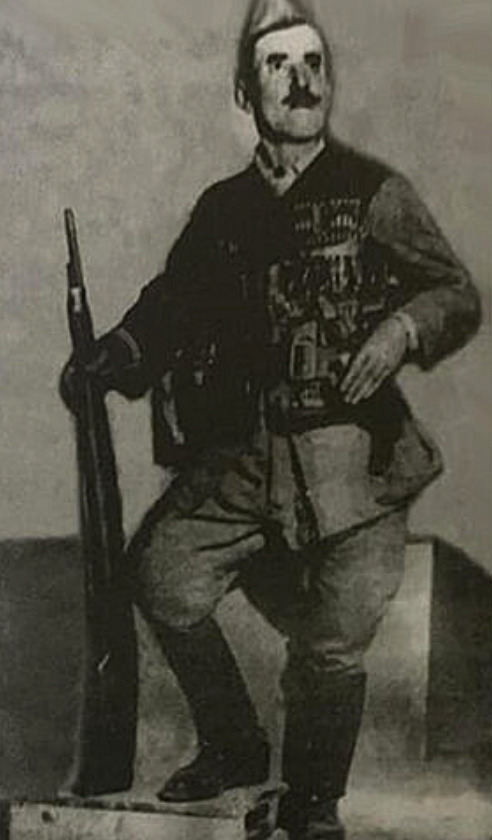Anastasios Papadopoulos (1896-1922), better known simply as Kotsa (ie. big) Nastas was a Greek freedom fighter during the Greek Genocide. Nastas was born in 1896 at Endik Pinar, a village near Erbaa in Pontus and became the general in charge of a unit called Toptsam which was based on the mountain Yaylacik. He was tall and spoke with a deep voice. His father, Papa Kyriakos was a well known priest and a legate to the Metropolitan of Amasya. Nastas took to the mountains at the age of 19. The leader of the freedom fighters at Toptsam at the time (1915) was Captain Iakof.
Freedom fighters in Pontus were formed out of males who had deserted Ottoman military battalions (Tr: Amele Taburlari) due to harsh treatment. In these battalions, Greeks were sent to barren locations and forced to work around the clock with little food and water. The death rate was high. The mountain, therefore, initially became a refuge for a large number of deserters but later became a refuge for other persecuted people too. Other freedom fighters to join him included Theofilos Hatzi-Pavlidis, Anastasios Tektonidis, Mikhail Ioannidis, Ioannis Yelastopoulos, Dimitrios Hatzi-Pavlidis, Vasilios Papadopoulos, Dimitrios Ioannidis and others. In a battle close to Endik Pinar in 1916 between freedom fighters and Turks, captain Iakof was killed and as a result Kotsa Nastas assumed the leadership at the age of 20.
Kotsa Nastas's most heroic work was during the Kemalist phase of the genocide when forces aligned with Mustafa Kemal committed large scale atrocities against Greeks in Pontus. In 1921, when those atrocities escalated, many Greeks fled to the mountains where Nastas and his men offered them protection. His actions gave hope to Greeks faced with the prospect of exile or massacre. At one point, Nastas supervised a force of 600 freedom fighters who provided refuge to 12,000 Greeks, mostly women and children.
The Kemalists referred to him as Kotsa Giaour (Kotsa the infidel). They entered into battle with him and his forces numerous times but failed. At one stage they sent military commander Liva Pasha to lead a large force against him but he too was unsuccessful.
In December 1922, Kotsa Nastas was killed at the village Ezenus by chettes. His murderers cut off his head and hung it on a telegraph pole in the town of Tokat. His death was celebrated by the Turks who shouted "We killed the leader of the Greeks!" In an attempt to take possession of his body, his brother George Papadopoulos was also killed. His wife Despina fled to Greece where she settled in Kozani along with two of his sisters and his brother Amvrosios. Many of the Greeks who flocked to Toptsam and were saved by Kotsa Nastas were expelled from Turkey after the exchange of populations and were sent to Greece where they created a village called Neocaesarea in the Katerini municipality.
Source:
Encyclopedia of Pontian Hellenism. Malliaris Paedia.
